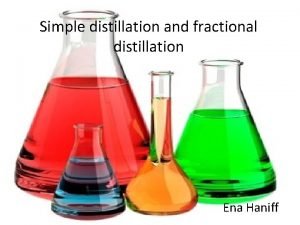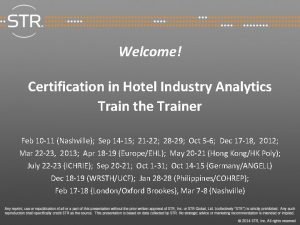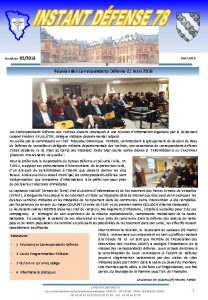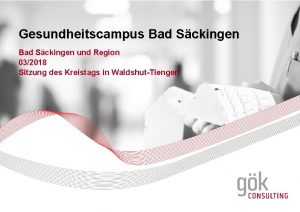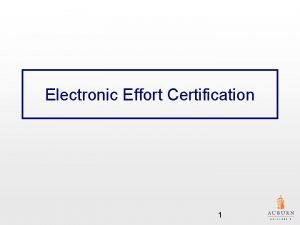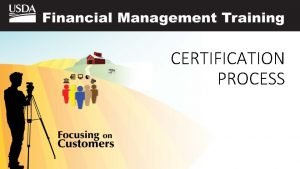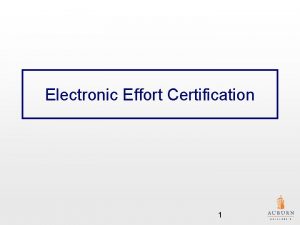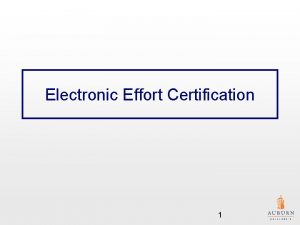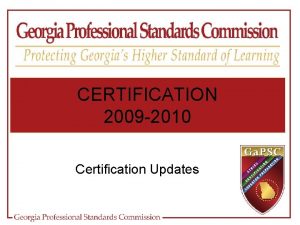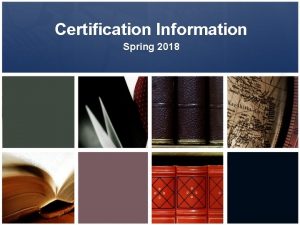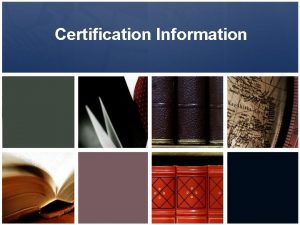Certification Conference 032018 Industry Discussion Topics Richard Day













- Slides: 13

Certification Conference 03/2018 Industry Discussion Topics Richard Day, Senior NDT Engineer Inspection Management, Plant Integrity, Technical Support, RWE Generation UK plc richard. day 2@rwe. com RWE Power International 10/24/2021 PAGE 1

Content – Presentation overview – UK certification – setting the context o Changing certification - key areas o Employers responsibilities o Stakeholders o Products o Threats – Summary RWE Power International 10/24/2021 PAGE 2

Certification Management Committee (CMC) Overview > The CMC comprises Institute members and individuals (volunteers) from representative industry sectors > It is mandated in assisting the Institute’s Certification Services Division (CSD) with a level of impartiality in developing policy in relation to certification matters > The CMC conducts its affairs in an open and transparent culture taking into account certificate holders’ perspectives and to ensure available certification meets the specific requirements pertinent to end-user requirements > The CMC members held a workshop in January 2018 to constructively consider certification activities and processes > This presentation captures points / observations raised with a view to continue the debate with interested parties to help formulate and shape the certification strategy towards the 2020’s RWE Power International 10/24/2021 PAGE 3

UK Certification Context (1) > NDT inspection methodology became an established part of the Quality Assurance process within the UK during the 196070’s > Various independent certification schemes were established, managed by major employing organisations within industry sectors e. g. Mo. D, Rolls Royce, CEGB, British Gas, British Rail > During this period, professional bodies such as The Welding Institute and the British Institute of Non-Destructive Testing started to develop national certification schemes (Certification Scheme for Welding Inspection Personnel [CSWIP] and Personnel Certification in NDT [PCN] respectively) in accordance with ISO defined codes of practice in order to homogenise and regulate the standard of competency within inspection personnel > By the 1980’s, 3 rd Party certification had generally replaced the employer led schemes within the industrial sector RWE Power International 10/24/2021 PAGE 4

Certification Context (2) > As 3 rd Party certification became the established norm, it was not without its own shortcomings, notably that training and examination now tended to be centred around manufacturing processes and major new build projects such as: - Oil & Gas (North Sea exploration and production) - Power Generation (large fossil fuel plant programme 500 -660 MW units, Nuclear programme) - Construction (national infrastructures i. e railways, bridge building, pipelines etc) - Manufacturing (defence, aerospace, automotive etc) > The time-honoured NDT inspection methods associated in these key industrial areas of activity focused towards the detection of flaws in base material stock or flaws introduced as a result of manufacturing process(es) > During the 1970/80’s, the feedstock of personnel moving or migrating into NDT were usually already found to be working in an associated engineering sector, often with formal engineering training, experience and transferable skill sets which would be of great benefit when undertaking NDT activities. RWE Power International 10/24/2021 PAGE 5

Certification – The Challenge Certification requirements change; circumstances that drove the requirements of 30/40 years ago may not always be now relevant Collectively, Certification Bodies have to challenge themselves to ensure that certification products meet the market’s current and future needs in areas such as: - > Certification responsibility ownership > Certification stakeholder management > Certification products are relevant and applicable > Certification alignment – national, international or global > Threats to certification RWE Power International 10/24/2021 PAGE 6

Employers Responsibilities > Compliance – an obligation or regulation that is fulfilled with or met > Competence – the condition of being capable; ability > ISO 9712: 2012 Section 5. 5. 5 – “Certification to this International Standard provides an attestation of general competence of the NDT operator. It does not represent an authorisation to operate, since this remains the responsibility of the employer, and the certificated employee may require additional specialist knowledge of parameters such as equipment, NDT procedures, materials and products specific to the employer. ” > Ultimately, it is employers responsibility to satisfy themselves that personnel undertaking NDT inspections are competent to do so and (in accordance with ISO 9712: 2012 Section 3. 21 – Operating authorisation) should issue a written authorisation to operate stating this RWE Power International 10/24/2021 PAGE 7

Certification Stakeholders Understand your stakeholders and you understand your business. Actively engaging, lobbying and working with stakeholders can offer benefits and establishes an understanding of how certification services are perceived, used in practice and positioned within market segments. Stakeholders include: - > Industry users – are products offered what industry really wants; market research > Employers / End users – do they really understand their role and responsibility in the process; educate and promote the added value of NDT > NDT certificate holders o Engagement with certification holders; remove the perception that their interests are not represented o Engagement with other schemes holders; by disregarding other technicians who operate under EN 4179, SNT-TC-1 A and trained by IA/OA’s (accredited by BINDT) leaves an opportunity missed > ATO/AQB’s – direct conduit to both industry and certification holders; provide tangible feedback on what is really needed > Academic establishments / Equipment manufacturers – awareness and insight into new inspection tools and inspection methodologies being developed; alignment > HSE / Plant Insurers – what are their concerns; where is their focus of interest currently targeted RWE Power International 10/24/2021 PAGE 8

Certification products RWE Power International 10/24/2021 PAGE 9

Certification products > Standard certification products MT, PT, UT and RT; are they future proof – would they benefit from mid term review and updating i. e. modern inspection equipment, applications, product technologies, new materials etc > Has 3 rd Party certification peaked – is there a return to more bespoke employer based applications and/or hybrid 2 nd-3 rd party schemes > Acceptance that new certification products may not have the potential for volume adoption as opposed to the historical past – now niche and targeted > Certification needs to be able to respond / develop quickly in a focused and targeted manner o Potential partnerships with equipment and academic institutions to add value and credibility to developing inspection technologies o Streamline the process to bring certification products quickly to market o Withdraw certification products that are no longer required > Harmonisation of certification through international or global alignment and agreement (i. e. ASNT embracing ISO 9712) RWE Power International 10/24/2021 PAGE 10

Certification threats > Poorly managed schemes or certification services undermine the integrity of certification across all sectors > Future technology developments i. e. AI / machine intelligence assessment systems > Lack of proactive engagement with stakeholders > An aversion to embrace change o Scepticism “We’ve always done it that way” or “it’ll never work” must not be used as blockers o Protectionism – can lead to stagnation o Business and commercial drivers can blur charitable objectives > Aging competency pool – no aligned succession management plan > Lack of in-depth understanding of engineering practices, manufacturing processes, materials and flaws / failure mechanisms in new entrants attempting initial certification examination limits effectiveness in making inspection assessment > Sector specific in-service training and certification still considered to lag behind generic manufacturing training and certification > RWE Power International 10/24/2021 PAGE 11

Summary > Seek out your stakeholders to partnership with them – Engage – Listen – Educate (two way process) – Develop products they want (not what you want) – Long term support > Develop internal processes that proactively identify, facilitate and produce certification services > Promote flexibility and lateral thinking in engineering solutions Be prepared for and embrace change RWE Power International 10/24/2021 PAGE 12

Thank you for your attention Richard Day, Senior NDT Engineer Inspection Management, Plant Integrity, Technical Support, RWE Generation UK plc richard. day 2@rwe. com RWE Power International 10/24/2021 PAGE 13
 Day 1 day 2 day 3 day 4
Day 1 day 2 day 3 day 4 Day 1 day 2 day 817
Day 1 day 2 day 817 Customer service discussion topics
Customer service discussion topics Group discussion in tamil
Group discussion in tamil Enlightenment salon
Enlightenment salon Group discussion is a modern method of assessing students
Group discussion is a modern method of assessing students Www.managementstudyguide.com
Www.managementstudyguide.com Group discussion definition
Group discussion definition Finance topics for discussion
Finance topics for discussion Discussion discussion
Discussion discussion Power in looking for richard
Power in looking for richard Hotel industry foundations & introduction to analytics
Hotel industry foundations & introduction to analytics Tcs ion industry honour certification
Tcs ion industry honour certification Tcs ion industry honour certification
Tcs ion industry honour certification









